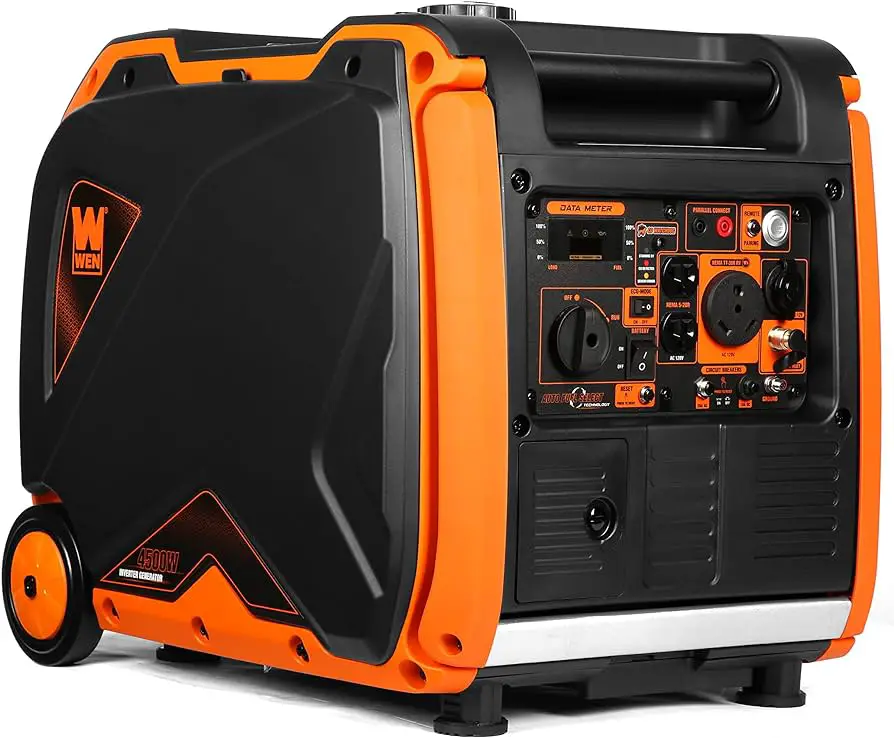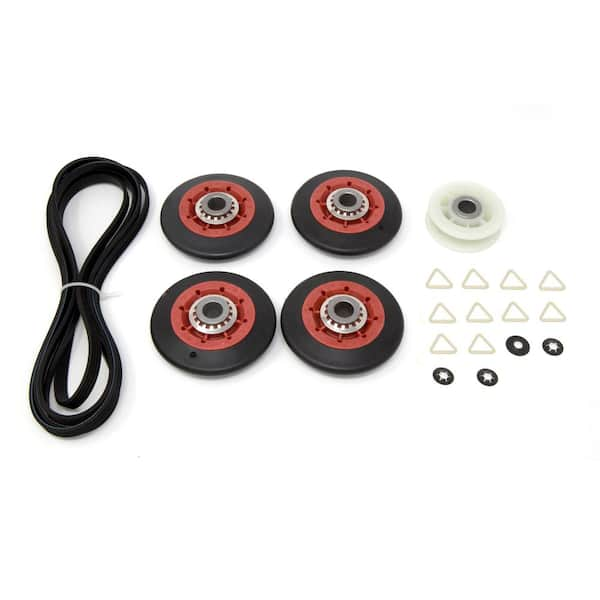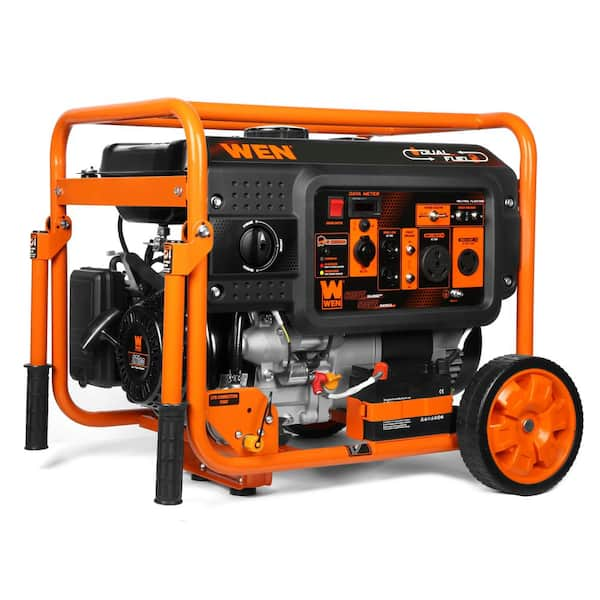The most common Wen generator problems can be resolved with troubleshooting techniques and routine maintenance. Is your Wen generator experiencing issues?
Don’t worry. We will discuss some common problems that may arise with Wen generators and provide simple solutions to address them. Whether you are facing starting issues, low power output, or generator stalls, we’ve got you covered. By following the tips and techniques provided you will be able to troubleshoot and fix these problems effectively, ensuring your Wen generator runs smoothly and efficiently.
Don’t let generator problems hinder your power supply- read on to find the solutions you need.

Common Generator Problems
Wen generators can encounter various issues, including fuel problems, low oil levels, and clogged air filters. These problems can lead to starting difficulties, power disruption, or even engine malfunction. Regular maintenance and prompt troubleshooting are essential for ensuring the smooth operation of Wen generators.
No Start
If your generator fails to start, it can be frustrating and leave you in a desperate situation without power. There are a few common reasons why a generator may not start.
- Fuel issues: Ensure that there is enough fuel in the tank and that the fuel valve is open. If the fuel has been sitting for a long time, it may have gone bad. Drain the fuel and replace it with fresh gasoline.
- Clogged fuel filter: A clogged fuel filter can restrict the flow of fuel and prevent the generator from starting. Check the fuel filter and clean or replace it if necessary.
- Spark plug problems: A faulty or dirty spark plug can prevent the generator from starting. Check the spark plug and clean or replace it if needed.
- Battery issues: If your generator has an electric start, a weak or dead battery can prevent it from starting. Check the battery and recharge or replace it if necessary.
Low Power Output
If your generator is running, but not producing the expected amount of power, there are a few potential causes for this issue.
- Overloading: If you are trying to power too many appliances or devices, your generator may not be able to handle the load. Disconnect some devices to reduce the load and see if the power output improves.
- Dirty air filter: A dirty air filter can restrict the airflow to the engine, leading to a decrease in power output. Clean or replace the air filter to improve power generation.
- Worn-out or damaged parts: Over time, the internal components of a generator can wear out or become damaged, affecting its power output. Consult a professional technician to diagnose and repair any faulty parts.
Overheating
An overheating generator can be a safety hazard and prevent it from functioning properly. Here are some common reasons for generator overheating:
- Blocked air intake or exhaust: Make sure the generator’s air intake and exhaust vents are not blocked by debris or obstructions. Clean the vents and ensure proper airflow to prevent overheating.
- Low coolant level: If your generator is equipped with a liquid cooling system, check the coolant level and top it up if it is low. Low coolant levels can lead to overheating.
- Excessive load: Running your generator beyond its capacity can cause it to overheat. Reduce the load on the generator and allow it to cool down before operating it again.
- Faulty cooling system: If your generator continues to overheat despite proper maintenance, there may be an issue with the cooling system. Consult a professional technician to diagnose and repair the problem.

Credit: www.amazon.com
Troubleshooting Tips
Troubleshooting Tips:
When it comes to dealing with generator problems, troubleshooting can save you time, money, and frustration. Before calling a professional, you can try these troubleshooting tips to address common issues with your Wen generator.
Check Fuel Levels
Fuel is Key: One of the most common reasons why a generator might fail to start is low fuel levels. Check the fuel gauge or dipstick to ensure that there is enough fuel in the tank. If the fuel level is low, fill it up with the appropriate fuel, such as gasoline or propane, depending on your generator model.
Fuel Quality: Besides quantity, fuel quality also matters. Stale fuel or debris in the fuel can cause blockages and prevent the generator from functioning correctly. If you suspect poor fuel quality, drain the old fuel and replace it with fresh fuel. Regularly replacing the fuel in your generator can help prevent future fuel-related issues.
Inspect Spark Plug
Spark Plug Condition: A faulty or dirty spark plug could be the culprit behind a generator that won’t start or runs poorly. Inspect the spark plug and check for any signs of damage, wear, or fouling. If necessary, clean the spark plug or replace it with a new one. Refer to your generator’s manual for specific instructions on removing and installing the spark plug.
Proper Spark Plug Gap: Ensure that the spark plug gap is set correctly according to the manufacturer’s specifications. Incorrect spark plug gap can affect the generator’s performance and lead to issues such as misfires or engine stalling. Using a feeler gauge, adjust the gap if needed to the recommended measurement.
Examine Air Filter
Air Filter Maintenance: A dirty or clogged air filter can obstruct airflow and lead to decreased generator performance. Regularly inspect the air filter and clean or replace it as necessary. Cleaning the air filter usually involves removing it from the generator and rinsing it with water or using compressed air to blow away any debris or dust.
Air Filter Replacement: If the air filter is damaged, excessively dirty, or no longer effective after cleaning, it’s recommended to replace it with a new one. A clean and functional air filter helps prevent contamination of the engine and ensures optimal generator operation.
In conclusion, by implementing these troubleshooting tips for your Wen generator, you can resolve many common problems that may occur. Remember to always consult your generator’s manual for specific instructions and seek professional assistance if necessary.
Electrical Issues
Electrical issues can be a common headache when dealing with Wen generators. Knowing how to diagnose and tackle these problems is crucial for maintaining uninterrupted power supply. Let’s take a closer look at some of the most prevalent electrical issues you might encounter with Wen generators.
Flickering Lights
Flickering lights can be a sign of an underlying electrical problem with your Wen generator. This issue often occurs due to a loose connection or inadequate power supply. A thorough inspection of the connection points and the generator’s electrical components is essential to identify and rectify the root cause of this problem.
Voltage Fluctuations
Voltage fluctuations can lead to various electrical appliances malfunctioning when connected to the generator. The erratic voltage output can damage sensitive equipment and hamper the smooth functioning of essential devices. Monitoring the voltage output with a reliable multimeter and making necessary adjustments to the generator’s voltage regulation system can help mitigate this issue.
Fuel System Problems
Clogged Fuel Line
A clogged fuel line can impede the flow of fuel to the generator.
Dirty Carburetor
A dirty carburetor can disrupt the fuel-air mixture needed for the generator to run smoothly.
Engine Running Rough
If your Wen generator’s engine is running rough, it may indicate potential issues that need to be addressed promptly. A rough-running engine can lead to decreased performance and, if left unchecked, can result in costly repairs. To ensure your generator operates at its best, addressing engine issues promptly is crucial.
Check Oil Levels
Checking the oil levels is a fundamental step in maintaining your Wen generator’s engine health. – Turn off the generator and let it cool before checking the oil level. – Unscrew the oil cap, wipe the dipstick clean, reinsert it, and then check the oil level. – Ensure the oil level is within the recommended range to prevent engine issues.
Inspect Exhaust System
Regular inspection of the exhaust system can help diagnose potential issues with a rough-running engine. – Check for any signs of blockages or leaks in the exhaust system. – Ensure the exhaust is properly connected and not damaged to maintain engine performance.

Credit: www.homedepot.com
Fixes For Common Problems
If your Wen generator is experiencing issues, fret not as some common problems are easily fixable. Here are simple solutions to two common problems that you may encounter with your Wen generator.
Cleaning The Carburetor
To clean the carburetor of your Wen generator, follow these steps:
- Turn off the generator and let it cool down completely.
- Remove the air filter cover and the air filter to gain access to the carburetor.
- Using a carburetor cleaner, carefully spray the interior of the carburetor to remove any dirt or debris.
- Reassemble the air filter and cover before restarting your generator.
Replacing Spark Plug
If your Wen generator is having issues due to a faulty spark plug, here’s how you can replace it:
- Turn off the generator and allow it to cool down.
- Locate the spark plug and use a spark plug wrench to carefully remove it.
- Inspect the old spark plug for any damage or wear and tear, then replace it with a new one.
- Secure the new spark plug in place and turn on your generator to ensure it operates smoothly.
Preventive Maintenance
Regular preventive maintenance is crucial for avoiding potential Wen generator problems. By adhering to a routine maintenance schedule, you can prevent costly repairs and ensure optimal performance of your generator. Stay proactive to extend the lifespan of your generator and minimize downtime.
Regular maintenance is crucial for keeping your Wen generator running smoothly and extending its lifespan. By performing simple preventive maintenance procedures, you can avoid common problems and ensure that your generator is always ready to provide reliable power when you need it. In this section, we will discuss two important aspects of preventive maintenance: regular oil change and proper storage practices.Regular Oil Change
Regular oil changes are essential for maintaining the optimal performance of your Wen generator. Over time, oil can become dirty and lose its lubricating properties, leading to increased friction, overheating, and wear and tear on the engine. To prevent these issues, make sure to change the oil in your generator according to the manufacturer’s recommendations. This is typically every 50-100 hours of operation or at least once a year if the generator is not used regularly. Follow these steps to perform an oil change:- Start by placing the generator on a level surface and allowing it to cool down completely.
- Locate the oil drain plug, usually located on the bottom of the engine.
- Place an oil pan underneath the drain plug to catch the old oil.
- Remove the drain plug and let the old oil drain completely.
- Replace the drain plug and wipe off any excess oil around the area.
- Refill the engine with the recommended type and amount of oil, as specified in the user manual.
- Finally, start the generator and let it run for a few minutes to ensure proper circulation of the new oil.
Proper Storage Practices
Proper storage is crucial for protecting your Wen generator from damage and ensuring that it starts easily when you need it. Whether you use your generator frequently or only occasionally, following these storage practices will help maintain its performance:- Clean the generator: Before storing your generator, make sure to clean it thoroughly. Remove any dirt, debris, or fuel residue from the exterior to prevent corrosion and blockage of ventilation openings.
- Empty the fuel tank: If you won’t be using the generator for an extended period, it’s important to empty the fuel tank. Storing a generator with fuel in the tank can lead to fuel degradation, carburetor clogging, and other problems. Run the generator until it completely runs out of fuel, following the proper shut-down procedure outlined in the user manual.
- Store in a cool, dry place: Choose a storage location that is protected from extreme temperatures, moisture, and direct sunlight. If possible, store the generator in a well-ventilated area to prevent the buildup of harmful fumes and to maintain optimal operating conditions.
- Protect against pests: To prevent rodents or insects from nesting in your generator, place mothballs or cotton balls soaked in peppermint oil around the unit. Additionally, cover the generator with a breathable cover or tarp to keep it shielded from dust and debris.

Credit: www.homedepot.com
Professional Assistance
Dealing with Wen generator problems can be frustrating, especially when you are relying on it for essential tasks or during emergencies. Rather than attempting to fix the issues yourself and potentially causing further damage, it’s essential to seek professional assistance. Knowing when to seek help and choosing a qualified technician can make all the difference in restoring your generator’s functionality quickly and efficiently.
When To Seek Help
If you notice any of these signs, it’s time to call in the experts:
- The generator fails to start or starts but immediately shuts off
- Unusual noises such as grinding or rattling when the generator is running
- Inconsistent power output or fluctuations in voltage
- Frequent tripping of circuit breakers or blown fuses
- Leaking fluids or visible damage to the generator
Choosing A Qualified Technician
When selecting a technician to repair your Wen generator, it’s crucial to ensure they are qualified and experienced. Consider the following essential factors:
- Certifications and Credentials: Look for technicians who have certifications from reputable organizations such as the Electrical Generating Systems Association (EGSA). These credentials demonstrate their expertise and commitment to quality work.
- Experience: Choose a technician who has substantial experience working specifically with Wen generators. Their familiarity with the brand and model can result in more accurate diagnostics and efficient repairs.
- Reputation: Do background research and read customer reviews to gauge the technician’s reputation. Look for positive feedback regarding their professionalism, reliability, and ability to solve generator problems effectively.
- Warranty and Insurance: Ensure the technician provides a warranty on their work and that they are adequately insured. This protects you from further expenses in case of any issues after the repair.
- Cost: While price shouldn’t be the sole determining factor, it’s essential to compare quotes from different technicians. Consider the technician’s reputation, expertise, and the quality of their previous work when making a decision.
By following these guidelines, you can find a qualified technician who will promptly diagnose and resolve your Wen generator problems, giving you peace of mind and a reliable power source whenever you need it.
Frequently Asked Questions On Wen Generator Problems
What Are Common Wen Generator Problems?
Some common Wen generator problems include starting issues, fuel problems, and overload shutdowns. Regular maintenance and troubleshooting can help prevent these issues.
How To Troubleshoot Wen Generator Starting Problems?
Check the fuel level, spark plug, and air filter. Ensure the choke is in the correct position. Clean or replace parts as needed for proper starting.
Why Is My Wen Generator Overheating?
Overheating can be caused by overloading the generator, insufficient ventilation, or dirty air filters. Turn off the generator and allow it to cool down before troubleshooting.
How To Prevent Fuel-related Problems In Wen Generator?
Use fresh fuel, stabilize it with a fuel stabilizer, and empty the fuel tank before storing the generator. Regularly check fuel lines and filters for any blockages.
Conclusion
Having generator problems can be frustrating, but with the right knowledge and precautions, they can be easily avoided. By regularly maintaining your generator and addressing any issues promptly, you can ensure that it operates smoothly when you need it the most.
Stay informed and proactive to avoid inconvenience during power outages.